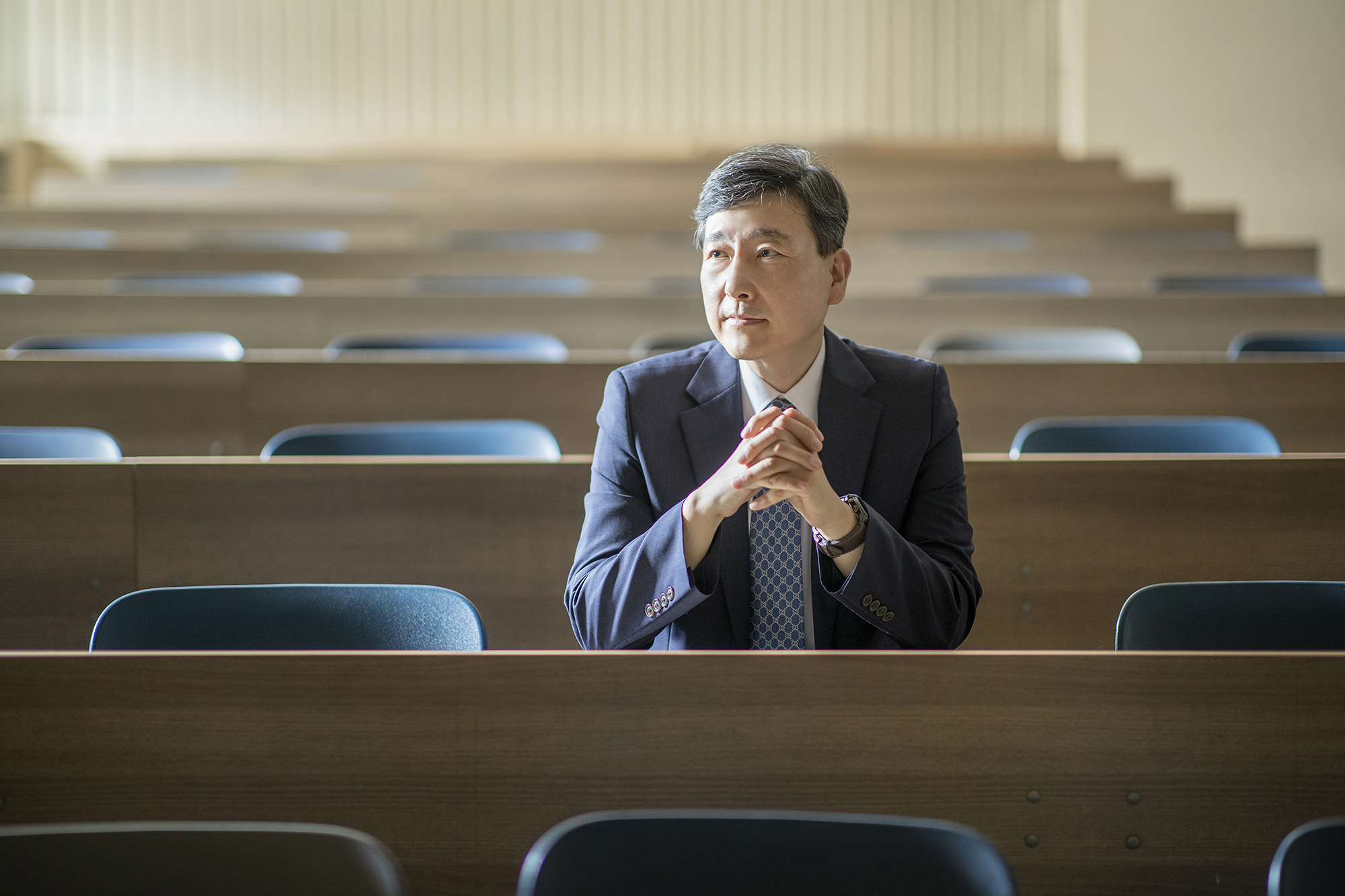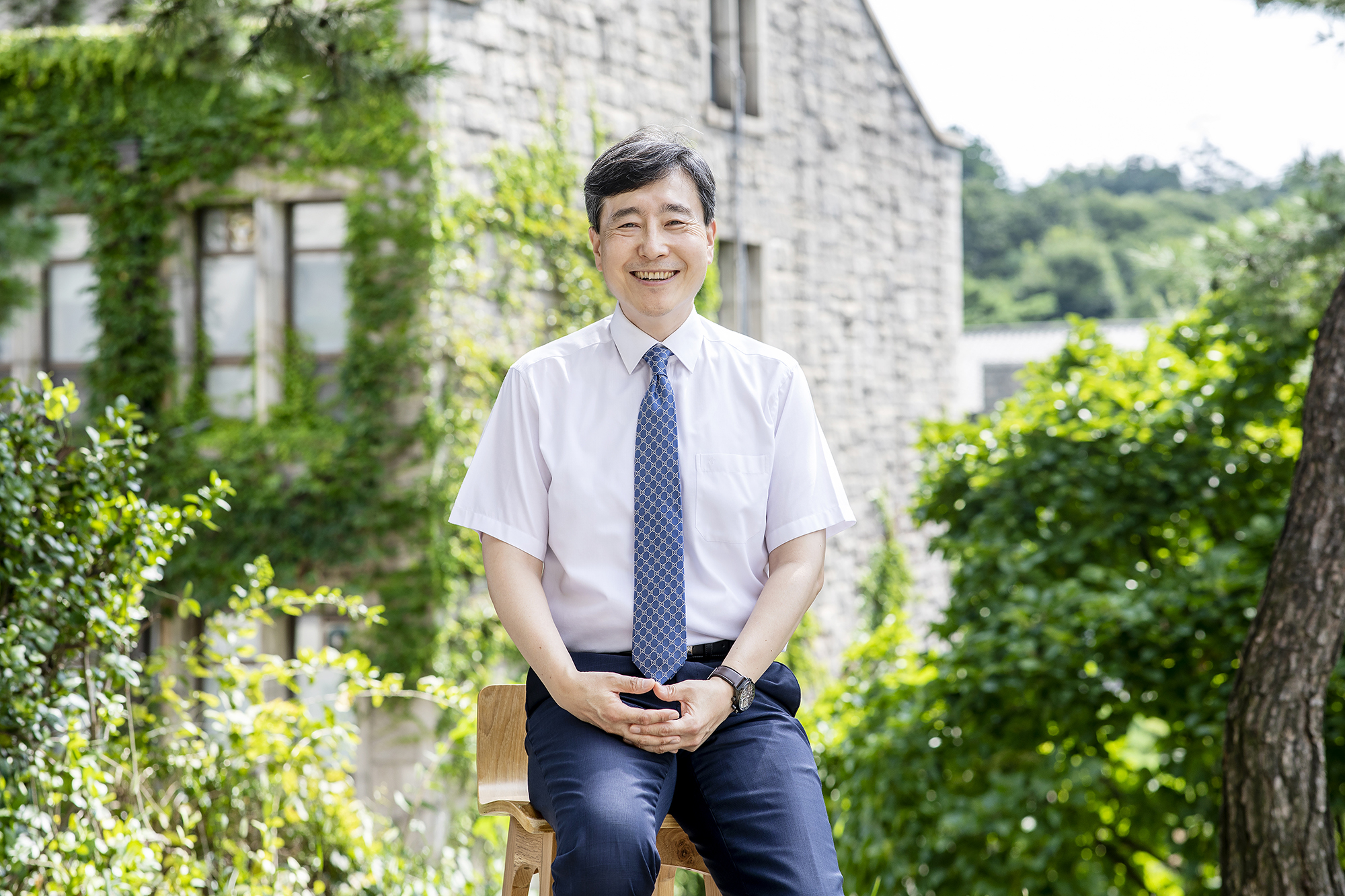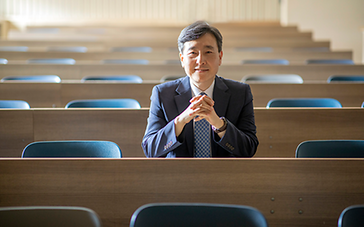- Happiness and Mastery of Work August 27, 2021
-
by Professor Chang Wonsup, Department of Education

The Illusion of Work-Life Balance Craze
Recently, there has been a craze over "work-life balance." This trend in isolation fully deserves an understanding and sympathy, with South Korea having one of the longest working hours in the world, to the extent where the government had to intervene to impose "52 hours a week" working hours legislation. Since so many people have been run over by their work, it seems imperative to reduce the overall work hours to somehow strike a balance in one's life in general. An individual's life should be in harmony with not only work but also other aspects such as family, friends, leisure, and self-development.
Nonetheless, I would like to point out a couple of problems with work-life balance. First, there should be a correction to the terminology, which refers to a balance between work and an individual's life. The following language places "work" and "life" at each end of the weighing scale while delivering the message that when there is an increase in one, there is naturally a decrease in another; when there are more works to do, your life must decrease, as if the time you spend working does not count as living. However, I believe that working hours are also a significant part of life, especially since they take up almost half of our awake time. Eventually, the terminology "work-life balance" should be corrected to "work and non-work life balance."
There is also a need to rethink the very value of work-life balance. The current craze for work-life balance assumes that happiness in life lies outside the boundaries of work, and thus a happy life becomes equivalent to a work-reduced life. However, in such logic, we only seek half of the happiness we could enjoy. You can only attain complete satisfaction in life when you also derive pleasure in work.
Ulrich Beck once explained the relationship between work and leisure by citing the metaphor of a cup of "cappuccino." Cappuccino is made by putting a layer of sweet foamed milk on top of a bitter espresso. Work is a complex and painful activity for anyone, especially when there is also the hardship of having to work with others in an organization, just like a cup of bitter espresso. However, we must remember that there is no way we could fill our lives with only leisure and play, just like how we could not solely enjoy milk foam for our much-needed coffee breaks. Like cappuccino with espresso as a foundation, work is a central foundation of our lives. No matter how bitter it might be, it is still a pleasure if we can enjoy its flavor and aroma. It is a difficult task, but if you could get a sense of accomplishment and the joy of growth in your work life while harmonizing work with the other areas of life, that would be true happiness.
I want to expand the previous analogy to say that our work life is gradually turning into a "cafe latte." Unlike cappuccino, which consists of espresso and steamed milk foam, cafe latte has them mixed evenly, making you feel milk's soft sweetness more than coffee's intense bitterness. Gradually over the years, our lives represent a mixed pattern rather than a clear distinction between work and leisure. The development of digital technology, along with the recent COVID-19 pandemic, has expanded the trend of working at home in society; we are virtually working regardless of time and place. In this "ubiquity of work" state, separating work from life has become more challenging.
Can We Ever Work Happily?
People hate to work. People desire to enjoy an affluent life without having to work for a living so much that even a building owner has become a coveted job. It is not a sin to be a building owner in this capitalistic society that we are living in. Still, there is a grave problem if it becomes a medium of refuge from working or a dream for the growing generations in society.
It has become tough to get a job, but even for those who succeeded in securing a job, are they working happily in the first place? I don't think so. Many new employees would simply snoop around and leave their hard-earned jobs soon. This may be because even if they have earned the so-called "good job," they were oblivious to the fact that they have to go through a hard time working, or maybe they could not stand being in the company for a long time. These people overlook a straightforward fact: work is bitter like espresso for everyone.
There has been wide popularity of sayings among South Korean office workers, such as "I do not need a sense of accomplishment, just give me the overtime pay," or "I am paid poorly, so there is nothing wrong with my work attitude being poor." Both of them reflect the mindset that working is just a means of livelihood. Such an attitude towards the role of work in life seems to be widely agreed upon in South Korea, where there is a strong tendency among the members of the working population to think that they are "machines earning money." Eventually, such an approach toward work would not result in individuals deriving happiness from work. Sure, the economic value of work is essential, and it is essentially the most fundamental value. However, work goes beyond the source of livelihood, as it simultaneously contains the meaning of social participation, contribution, personal growth, and self-realization.
Work is the activity of producing or providing something of value for others. Among countless occupations officially recognized by the state, I do not think there is a job that should be classified as harmful. After all, work is bound to create added economic value while contributing to others. I do not believe that everyone in society should become a philanthropist or a saint; it is simply not possible. Most people today would do something meaningful in economic and social value while maintaining their livelihood. With that being said, being faithful to one's work is the way to contribute to others, and unfortunately, a lot of people tend to fail to recognize how valuable and meaningful their work is.
There is a story that goes like this. Someone once asked three builders what they were doing as he passed by. "Can't you see? I am stacking bricks," responded the first builder. "I am earning a living," answered the second builder. "I am building a temple," replied the third builder, beaming with pride. These three builders are doing the exact same work, but who do you think would be the happiest?
What is a happy life? The word "happiness" seems too abstract a concept. If we try to be a bit more specific with the definition of happiness, we are one step close to attaining joy and accomplishment in life. If one can consistently feel fun and satisfaction, we can say it is a happy life. Can we derive such happiness from work? We can enjoy work with passion while feeling accomplished by showing excellent performance in our occupation. Furthermore, as we acquire more knowledge and know-how in work, we are granted the chance to grow more and more. This is what happy working life would be like.
Work of a Master
When it comes to the word "master," many people would come up with images such as successors of tradition, handcrafts, and stubbornness. However, such an image of a master may be mere relics of the old times, an anachronistic concept, to be precise. The master I am referring to does not just refer to the traditional handicraftsman who makes pottery and brassware; it refers to the masters of work in modern society.
The term master is still commonly used in our lives. When we see someone who does his job well and is a model to others, we admire them, saying, "That's a real master at their work." Whether you are a cook, movie star, doctor, or IT programmer, you can be considered a master if you are recognized as the best in that field. With that, I would like to define a modern master as "an exemplary person to set an example in the workplace." A master works to be a role model for other workers.
When becoming a master, we can derive happiness from work. How disgraceful would it be to work only to make money for a living? How miserable would it be to work inevitably because you are managed and controlled by someone with higher authority? Work is a bittersweet thing, but if it is something you have to do anyway, you should search for joy and a sense of fulfillment in your work to truly be happy.
For masters, work simply goes beyond means of livelihood. Even though a master might have started working for their livelihood at first, they would discover the value of the work during their career, develop skills in their field, and eventually leads to a path that contributes to the community. A master is a happy person at work who gains joy from the process of working itself, being engrossed, feeling happy and accomplished from the results of their work. Performance and successes are important, but the consistent opportunity to learn and develop brings the most pleasure to a master.
A master does not take refuge from work, as they ironically gained liberation from work. Having the highest level of proficiency and expertise in their field, it is hard for anyone to give orders or unwanted advice, allowing the master to work according to their rules and rhythm. This is how you can truly be free from work. The liberation from work cannot be attained by fleeing from one's responsibility; the only way possible is to go deeper into one's work to pursue the path of a master.
For the Mastery of Work
Work is the fundamental activity located at the center of human life. It has been so far, and so is the present era of the "fourth industrial revolution." However, the concept and the world of work have changed, and its transformation will continue in the future. Automation based on artificial intelligence and robots will be the key to the change. Robots can replace humans in occupations that fit the stereotypical concepts of manual and repetitive work. Thus, in a new industrial society, we need to have unique knowledge, skill, and creativity that machines cannot replace. We are now demanded to build capacities to tackle problems of greater complexity, think critically, and continuously create new ideas. Not only that, but we also must be able to cooperate and empathize with others while keeping a cool head when it comes to judgments and decisions.
"Meaningful work" is essential, not just for those who are doing the work but also for those who are consuming the product of their work. A worker must find the fun and value of their work, manage and control the work processes, and work passionately, pouring oneself into it. Only when one works like that unique production and service irreplaceable by machines can be attained. No matter how trivial it may seem, giving one's best in every single work process would make a working experience where one can receive recognition from others and opportunities to develop.
I want to present "modern masters" as the ideal talents of the new era. This is the conclusion I reached after studying the lives of dedicated workers, not only in traditional fields like hanbok and pottery or those in technical fields such as bakery and tailoring, but also the modern masters across various fields such as law, medicine, IT, acting, etc. Though the type of work they do and the methods of work differ, there are very similar characteristics regarding their attitude towards their work and their way of living. I have defined these characteristics as "mastery." To be a master goes beyond the level of having the attitude of a master, as one has to practice and show behavioral characteristics of this mastery. The result of such work naturally produces the best products or services. Mastery comprises factors such as the will to grow, arduous training, liberation from work, broadening of learning, and experience of being the best. Qualities of constant self-renewal and growth have been identified as key traits penetrating these factors.
How should we work? For that, we can refer to how Richard Sennett distinguished "Homo Faber" from "Animal Laborans." A homo faber would lead a life creating something while contributing to the community, and they not only ask "how" but also "why" as they live their lives. Their hands and head are one, as they think while acting. In short, they are masters with an attitude of being immersed in their work with a "thinking hand." An animal laborans, on the other hand, works to live. Will you work just for a living as an "animal laborans," or work meaningfully and happily as a "homo faber?" The answer might seem clear, but the decision is up to each one of us.
Professor Chang Wonsup is a professor at the Department of Education, College of Educational Sciences, conducting research on issues such as work education, human resources development, and adult education.
show mobile menu
mobile menu




